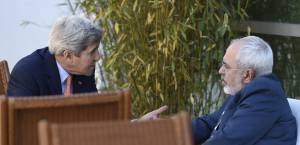With only two days left until the deadline for an agreement, reports emerging from the nuclear talks with Iran indicate that significant differences between the two sides still remain. Iran is toughening its stance while the West is willing to offer even more concessions.

US Secretary of State John Kerry, left, talks with Iranian Foreign Minister Mohammad Javad Zarif. (AP/Susan Walsh, Pool)
Negotiations over Iran’s nuclear program are entering their final phase, with just 48 hours left until the deadline for Iran and the six world powers to reach a deal.
With the June 30th cutoff looming, US Secretary of State John Kerry met Sunday in Vienna with Iranian Foreign Minister Mohammad Javad Zarif. It was their third encounter since Saturday. Other foreign ministers are expected to join.
The goal of the talks involving Iran and the U.S., Britain, China, France, Germany and Russia is a deal that would crimp Tehran’s capacity to make nuclear weapons in exchange for sanctions relief.
On Saturday, diplomats said Iran was considering a US-backed plan for it to send enriched uranium to another country for sale as reactor fuel, a step that would resolve one of several outstanding issues.
After nearly a decade of international diplomacy, negotiators are trying to reach a final agreement by Tuesday that would curb Iran’s nuclear activities for a decade and put tens of billions of dollars back into the Iranian economy through the easing of financial sanctions. The deadline is a bit soft; if they reach a deal any time in the next couple of weeks, negotiators will consider it a victory, but significant obstacles remain.
Iran still maintains that it will not allow inspectors to visit military sites or to interview scientists to ensure compliance and to probe its past history of nuclear testing.
Ayatollah Ali Khamenei, the Islamic Republic’s supreme leader, says he wants all economic sanctions lifted before the deal is signed, while the P5+1 maintain that they will be removed in tandem with Iran’s compliance with the agreement.
A plan for snapping back sanctions into place if the Iranians are caught cheating has yet to be formulated.
Meanwhile, Israel is threatening potential military action to destroy Iran’s nuclear infrastructure, and Saudi Arabia’s Sunni monarchy is considering an atomic program of its own to match that of its Shiite neighbor.
The French have taken a public posture of being even tougher on proliferation than the Americans. They delayed a 2013 interim agreement with Iran out of concern that the deal was not tough enough on Tehran. French officials have made similar complaints about the emerging package and have threatened to block consensus unless their concerns are addressed.
Netanyahu Warns of Last-Minute Concessions to Iran
Prime Minister Benjamin Netanyahu addressed the Israel Air Force (IAF) pilots’ course graduation ceremony on Thursday, where he warned that as the deadline nears, Iran is strengthening its stance while the P5+1 are buckling and offering more concessions.

Prime Minister Benjamin Netanyahu congratulates newly graduated Israeli Air Force soldiers. (Kobi Gideon/GPO)
“The foremost threat that endangers our security is Iran’s effort to arm itself with nuclear weapons,” the Israeli leader stated. “Concessions to Iran are increasing as we approach the date that has been determined between the major powers and Iran for achieving the goals. These concessions are whetting Iran’s appetite. Every day it raises its demands in order to extort even more concessions. Even if, in the next few days, Iran would concede on some of these demands, the basic concession by the major powers would still be considerable and there will be a glaring withdrawal from the red lines that the major powers had previously declared in public.”
Saying the agreement is “fundamentally flawed,” Netanyahu again warned that it leaves Iran with a path to achieve an arsenal of nuclear bombs within a decade. “It enables Iran to break out to nuclear weapons before then, thanks to monitoring that is full of holes,” he said.
He further warned that the agreement would fund Iran’s terror machine and “gives Iran many billions” for its subversive activities.
“It is still not too late to take stock,” Netanyahu urged. “It is still not too late to insist on a good agreement. And it is certainly still not too late to not move forward on a bad agreement. It has always been said by various world leaders, by the leaders of the major powers, and I repeat it now: No agreement is better than a bad agreement. But whatever happens, Israel will always defend itself, and in this the air force will play a major part.”
By: United with Israel Staff and AP

Sign the Petition to Stop a Nuclear Iran
The US Congress must ensure that sanctions against Iran remain in force until the nuclear threat is completely eliminated.
I strongly oppose easing sanctions before the nuclear threat from Iran has been eliminated. Allowing Iran to enrich uranium without being subject to 'anytime, anywhere' inspections is extremely dangerous and unacceptable. Iran's nuclear program must be stopped.
See our Privacy PolicyDo You Love Israel? Make a Donation - Show Your Support!
Donate to vital charities that help protect Israeli citizens and inspire millions around the world to support Israel too!
Now more than ever, Israel needs your help to fight and win the war -- including on the battlefield of public opinion.
Antisemitism, anti-Israel bias and boycotts are out of control. Israel's enemies are inciting terror and violence against innocent Israelis and Jews around the world. Help us fight back!






















